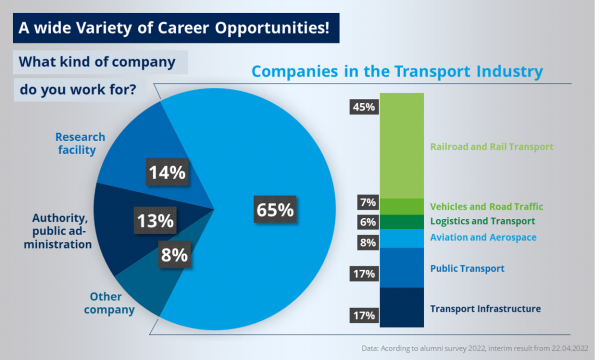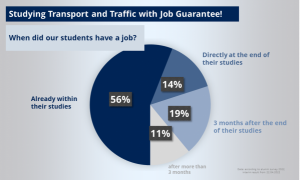
You are here
The Federal Employment Agency's online portal "abi.de" provides information on study and training programmes.
A current article deals with the "Transport of the Future". In conversation: a TUD transport student and Dean Prof. Regine Gerike.
The career guidance website of the Federal Employment Agency "abi.de" presents the occupational field of transport and mobility in an article published at the beginning of January 2024. The editorial team spoke to two people from the "Friedrich List" Faculty of Transport and Traffic Sciences at TU Dresden (TUD).
- Victor Nitzsche is studying transport engineering in the 5th semester and would like to specialise in "transport planning and traffic engineering" in his main degree course
- Prof. Regine Gerike is the Dean of the "Friedrich List" Faculty of Transport and Traffic Sciences, where she heads the Chair of Mobility System Planning.
When planning infrastructure, you have to think about the needs of all road users - by car, bike or on foot. And smart infrastructure can encourage people to change their mobility behavior.
Efficiency, speed, cost-effectiveness and sustainability are key terms when it comes to the mobility of the future. Technical innovations accompanied by sensible and customer-orientated planning form the cornerstone for the upcoming transport revolution. Students on the six transport and traffic science degree courses at TU Dresden acquire sound theoretical and practical knowledge during their studies in order to analyse, plan, measure and design complex transport systems. Victor's degree programme in traffic engineering therefore covers everything from the basics of mathematics and technical mechanics to traffic psychology, in order to prepare him and the other prospective engineers optimally for their future professional fields of application.
Meanwhile, Dean Gerike looks at the challenges involved in successfully shaping the necessary transport transition. Co-operation with the disciplines of economics, computer science and sociology will play a decisive role in this.
Transport and mobility and their design are global topics of the future with a great need for skilled labour. Graduates of the "Friedrich List" Faculty of Transport and Traffic Sciences are highly sought-after employees. The variety of employers looking for transport experts ranges from companies in the transport industry to public authorities and research institutions - as a survey conducted by the faculty in 2022 among graduates of the faculty shows (see graphic below).
In the survey, 70 per cent of respondents stated that they had secured their first permanent job during their studies or directly at the end of their studies. A further 19 per cent were in permanent employment no later than three months after the end of their studies (see chart on the right).

Diverse career prospects for transport students: Transport departments at city, municipal, state and federal authorities; institutions with tasks in the planning and operation of road, rail and water transport facilities; urban and regional planning and environmental protection; public transport companies; planning and consulting offices; railway and aviation companies; postal and logistics service providers, logistics sectors; vehicle, plant and construction industries; teaching and research institutions

70 per cent of graduates from the "Friedrich List" Faculty of Transport and Traffic Sciences at TU Dresden already have their first permanent job during their studies or directly after graduation. Almost all graduates embark on attractive career paths after 3 months of looking for a job at the latest.
Studying Transport and Taffic - What else?!
Contact at TU Dresden
Questions about studying transport and traffic at TU Dresden?
Then ask the
Service Team "Studying Transport and Traffic"
110,000
Employees must be hired for the transport transition by 2030 in Germany
Source: VDV - Die Verkehrsunternehmen
